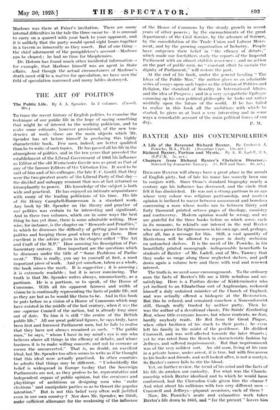THE ART OF POLITICS
The Public Life. By J. A. Spender. In 2 volumes. (Cassell. 39s.)
To trace the recent history of English politics, to examine the technique of our public life in the hope of saying something that might be of interest to the working politician, and to make some estimate, however provisional, of the new ten- dencies at work--these are the main objects which Mr. Spender has set before himself in producing this highly characteristic book. Few men, indeed, are better qualified thanim to write of such topics. He has passed all his life in the atmosphere of politics, and in the ten years that preceded the establishment of the Liberal Government of 1906 his influence as Editor of the old Westminster Gazette was as great as that of any of the famous Editors of 11:e- Victorian Era. It used to be said of him and of his colleague, the late F. C. Gould, that they were the two greatest assets of the Liberal Party of that day— the divided and unhappy remnant that was at last returned so triumphantly to power. His knowledge of the subject is both wide and practical. He has enjoyed an intimate acquaintance with many of the leading politicians of his time. His life of Sir Henry Campbell-Bannerman is a standard work. Any book by .Mr. Spender on the theory and practice of our politics was certain to be interesting and significant. And in these two volumes, which are in some ways the best thing he has yet done, there is some admirable writing. How Wise, for instance, is the chapter on " Rewards and Penalties," in which he discusses the difficulty of getting good men into politics and keeping them good when they get there. How excellent is the advice given in the chapter called " The Art and Craft of the M.P." How amusing his description of Par- liamentary oratory. How important arc the questions which he discusses under the title of " Some Problems of Parlia- ment." This is really, you say to yourself at first, a most important piece of work. And yet somehow, taken as a whole, the- book misses the mark. It is suggestive ; it is amusing ; it is extremely readable ; but it is never convincing. The truth is that Mr. Spender writes always, unconsciously, as a partisan. He is a partisan, so to speak, of the House of Commons. With all his apparent fairness and width of vision lie is continually representing the facts of public life, not as they arc but as he would like them to be. And in this book he puts before us a vision of a House of Commons which may have existed in the middle of the last century, when it was the one supreme Council of the nation, but is already long since out of date. To him it is still " the centre of the British public life." All our great political figures, lie says truly, have been first and foremost Parliament men, but he fails to realise that they have not always remained as such. " The public man," he says, " whom I have in my mind's eye is one who believes above all things in the efficacy of debate, and whose business it is to make willing converts and not to overawe or coerce the unconverted." That is, no doubt, an excellent ideal, but Mr. Spender too often seems to write as if he thought that this ideal were actually practised. In other countries lie admits that things may be different. - " Undoubtedly the belief is widespread in Europe to-day that the Sovereign Parliaments are not, as they profess to be, representative and independent organs of public opinion, but the creatures and playthings of ambitious or designing men who ' make elections' and manipulate parties so as to thwart the popular intention." But is not this belief very often well justified even in our own country ? Nor does Mr. Spender, we think, make sufficient allowance for -the weakening of the -influence
of the House of Commons by the steady growth in recent years of other 'powers ; by the encroachments of the great departments of the Civil Service, by the advance of Science, by the consolidation of the Trade Union and Labour MoVe- ment, and by the growing organization of Industry. People have outgrown their belief in " the efficacy of debate.," ' which made our forefathers study the reports of the Imperial Parliament with an almost childish reverence : and no action on the part of public men, no " constant effort to sustain the dignity of Parliament," will restore the past.
At the end of his book, under the general heading " The Ideas of the Public Man," the author gives us an admirable series of essays upon such topics as the relation of Polities and Religion, the standard of Morality in International Affairs, and the idea of Progress ; and in a very sympathetic Epilogue summing up his own political philosophy he looks out rather wistfully upon the future of the world. If he has tailed' to realize in this book all the ambitions with which he started, he gives us at least a very interesting and -in some ways a remarkable account of the main political forces of our










































 Previous page
Previous page